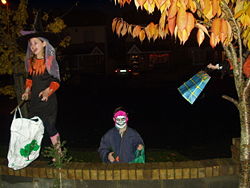Some Halloween Traditions

A Halloween scene in Dublin, Ireland.
The following news item explains some of the origins of traditions associated with Halloween:
Kansas State Collegian
Twist on Traditions
Published: Thursday, October 30, 2008
One of the most plausible theories on the origin of Halloween is that the ancient Celts held an annual harvest celebration to mark the end of summer, usually a spirit-centered event.
However, people from many religious and cultural backgrounds come together to celebrate Halloween and the fall season, whether traditional or alternative.
“People indigenous to the isle of Great Britain, people of Irish descent, viewed Halloween as a time diminishing the void between the spirit world and real world,” said Cien Conner, president of the Alliance for Understanding Religious Alternatives.
On that holiday, known then as “Samhain,” it was believed that the dead were able to mingle with the living and that ghosts and other supernatural beings walked the earth.
“They would carve out turnips and place lights inside them, leaving offerings of food and drink, as a means of preventing spirits from haunting them,” Conner said…
Ryan Hayden, senior pastor of University Christian Church, offered his additional historical insight.
“Philosophically, Halloween was a time to scare away evil spirits by wearing something deemed scary,” Hayden said. “That’s kind of funny, since I suspect demons were not scared of the costumes a few hundred years ago any more than they would be now. In principle, Halloween almost makes fun of Satanic power.”
However, some religions, like Islam, do not prefer its members to celebrate Halloween at all.
“It is not [forbidden], but it is not encouraged,” said Ibrahim Saleh, treasurer of the Islamic Center of Manhattan. “Our prophet Mohammed emphasized that we should only celebrate our religious holidays. It is better to avoid it.
“It is really important to explain to our children – when our kids go out and celebrate – that they know it is not a Muslim holiday, as it has nothing to do with our religion.”
Other traditional Halloween events like trick-or-treating are rooted in historical customs.
For example, during “Samhain,” early Christians would go from village to village begging for “soul cakes” made out of square pieces of bread. It was believed in this practice — called “souling” — that the more cakes you gave, the more prayers would be said for dead relatives, expediting their ascent into heaven. Irish children would also carve potatoes and light them up, in commemoration of Jack, an Irish villain so wicked neither the devil nor God wanted him.
The word Halloween, however, comes from the Catholic Church.
“For Catholics, Halloween is the eve of ‘All Saints Day’ and we encourage our kids to dress up as saints and know their stories,” said Rosie Rundell, pastor of associate at Seven Dolors Elementary School in Manhattan. “We celebrate with [Catholic] mass on November 1st, it is a holy day of obligation in honor of saints.”
Perhaps I should add that when I attended Catholic school, no one suggested that we dress up as “saints”. This seems to be a more recent, more “politically correct”, spin on this pagan holiday.
Halloween is one more pagan holiday that allows critics of Christianity to point out the false practices that many who profess it adhere to. It was adopted as an inappropriate compromise to attract members by Greco-Roman supporters–it is clearly not a biblical holy day.
Real Christians do not celebrate Halloween. Do you?
Three articles of possibly related interest may include:
Is Halloween Holy Time for Christians? This article provides some historical and biblical insight on this question.
Is There “An Annual Worship Calendar” In the Bible? This paper provides a biblical and historical critique of several articles, including one by WCG which states that this should be a local decision. What do the Holy Days mean? Also you can click here for the calendar of Holy Days.
The History of Early Christianity Are you aware that what most people believe is not what truly happened to the true Christian church? Do you know where the early church was based? Do you know what were the doctrines of the early church? Is your faith really based upon the truth or compromise?
 |
Tweet |
|